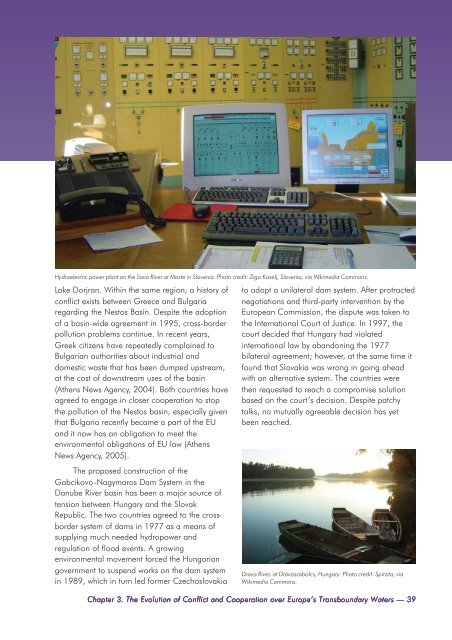Europe - UNEP
Europe - UNEP
Europe - UNEP
Create successful ePaper yourself
Turn your PDF publications into a flip-book with our unique Google optimized e-Paper software.
Hydroelectric power plant on the Sava River at Moste in Slovenia. Photo credit: Ziga Koselj, Slovenia, via Wikimedia Commons.<br />
Lake Dorjran. Within the same region, a history of<br />
conflict exists between Greece and Bulgaria<br />
regarding the Nestos Basin. Despite the adoption<br />
of a basin-wide agreement in 1995, cross-border<br />
pollution problems continue. In recent years,<br />
Greek citizens have repeatedly complained to<br />
Bulgarian authorities about industrial and<br />
domestic waste that has been dumped upstream,<br />
at the cost of downstream uses of the basin<br />
(Athens News Agency, 2004). Both countries have<br />
agreed to engage in closer cooperation to stop<br />
the pollution of the Nestos basin, especially given<br />
that Bulgaria recently became a part of the EU<br />
and it now has an obligation to meet the<br />
environmental obligations of EU law (Athens<br />
News Agency, 2005).<br />
The proposed construction of the<br />
Gabcikovo-Nagymaros Dam System in the<br />
Danube River basin has been a major source of<br />
tension between Hungary and the Slovak<br />
Republic. The two countries agreed to the crossborder<br />
system of dams in 1977 as a means of<br />
supplying much needed hydropower and<br />
regulation of flood events. A growing<br />
environmental movement forced the Hungarian<br />
government to suspend works on the dam system<br />
in 1989, which in turn led former Czechoslovakia<br />
to adopt a unilateral dam system. After protracted<br />
negotiations and third-party intervention by the<br />
<strong>Europe</strong>an Commission, the dispute was taken to<br />
the International Court of Justice. In 1997, the<br />
court decided that Hungary had violated<br />
international law by abandoning the 1977<br />
bilateral agreement; however, at the same time it<br />
found that Slovakia was wrong in going ahead<br />
with an alternative system. The countries were<br />
then requested to reach a compromise solution<br />
based on the court’s decision. Despite patchy<br />
talks, no mutually agreeable decision has yet<br />
been reached.<br />
Drava River, at Drávaszabolcs, Hungary. Photo credit: Spinsta, via<br />
Wikimedia Commons.<br />
Chapter 3. The Evolution of Conflict and Cooperation over <strong>Europe</strong>’s Transboundary Waters — 39
















